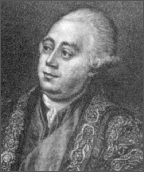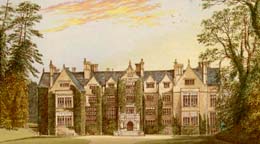
Prime Minister: 28 January 1770-27 March 1782. Frederick North was born on 13 April 1732. He was the eldest of six children; his parents were Francis, first Earl of Guilford and Lady Lucy Montagu. The other children came from Guilford's second marriage. North did have a sister who married a tradesman, whereupon her family denied her existence. Lord North was educated at Eton between 1742 and 1748; he then went to Trinity College Oxford and in 1750 was awarded an MA. After leaving Oxford he travelled in Europe, visiting Leipzig where he studied at the University. He visited Vienna, Milan and Paris, returning to England in 1753.
In 1754 he was elected to parliament for the family borough of Banbury and two years later married Anne Speke, the daughter of a Somerset landowner. He made his maiden speech in the House of Commons in 1757 and in 1759 accepted his first ministerial post as a Lord of the Treasury in Newcastle's ministry. The Duke of Newcastle was a distant cousin of North. On Newcastle's resignation in 1762, North remained in office in Bute's ministry and supported the government's case against Wilkes in the North Briton affair of 1764 in Grenville's ministry. When the Marquis of Rockingham took office, North resigned, refusing to accept the post of Vice Treasurer of Ireland.
North was appointed Joint Paymaster of the Forces in Chatham's ministry and became a Privy Counsellor in 1766. Following the death of Charles Townshend in 1767, North accepted the post of Chancellor of the Exchequer and in 1768 he became Leader of the House of Commons. It was Lord North who declared John Wilkes' election at Middlesex null and void in 1768.
In 1770, North became PM on the resignation of his cousin, the Duke of Grafton. He decided on a conciliatory approach to the problems with the American colonies and repealed four of the five Townshend Duties that had been passed in 1767 to raise a revenue from the American colonies. However, he chose to retain the tax on tea as a "peppercorn rent". He also became embroiled in the attempts to prevent London printers from publishing reports of the debates in the House of Commons but after parliament declared that it was a breach of privilege to publish debates, allowed the matter to drop.
North received two honours in 1772 which indicate the respect that people had for him. He was created a Knight of the Garter in June and was one of the few commoners to be so honoured. In October he was elected unanimously as Chancellor of Oxford University and Benjamin Franklin attended North's investiture. In the same year, North put the Royal Marriages Act to parliament: this prevented the marriage of any member of the royal family without the monarch's consent. George III required this legislation to be passed following the marriages of two of his siblings to 'unsuitable' persons.

Wroxton Abbey, Oxfordshire. This was the home of Lord North.
North's ministry passed the Regulating Act for India in 1773, followed by the Tea Act that led to the Boston Tea Party and the subsequent Coercive Acts of 1774. Ironically, the Tea Act had nothing to do with the American colonies but everything to do with rescuing the East India Company from bankruptcy: the result of the legislation was the loss of the American colonies. The government also passed the Quebec Act, which the American colonists saw as a fifth Coercive Act although it was not. It was during North's ministry that the American War of Independence was fought and the colonies were lost to Britain.
Lord North also faced problems in Ireland, being forced to implement measures to relax restrictions on Irish trade in 1779. North was threatened by the mob during the Gordon Riots of 1780 and finally he was allowed by the king to resign office in March 1782. He had asked to be allowed to leave office on a number of occasions prior to this, but George III always refused him. He was succeeded as PM by the second Marquis of Rockingham.
In 1783, Charles James Fox and Lord North held meetings to discuss how to return to office and how best to remove Shelburne from his premiership. In March 1783, Fox and North nominated the Duke of Portland as a neutral PM and they took office as Foreign Secretary and Home Secretary respectively. However, the coalition ministry did not last long, being removed by the king in December 1783 over the India Bill. Pitt the Younger became PM at that point.
By 1787, Lord North was beginning to go blind and appeared in the House of Commons more and more rarely. After North had become totally blind, he was visited by an old opponent, Isaac Barré who also was blind. North greeted him with the words, 'Though you and I have had our quarrels in the past, I wager there are no two men in England who would be happier to see one another today'.

All Saints' Church, Wroxton. Lord North is buried here.
In August 1790 Lord North succeeded his father as the second Earl of Guilford and was led to his place in the House of Lords. On 5 August 1792, he died and was buried at All Saints Church, Wroxton (Oxfordshire) near his family home of Wroxton Abbey. Ironically, North's family home is now a school for Americans in England.
Recommended Reading
Cannon, J. Lord North: The Noble Lord in the Blue Ribbon. London, 1970.
Thomas, P.D.G. Lord North. London 1976.
Valentine, A. Lord North. 2 vols. Norman, Oklahoma, 1967.
Last modified 28 February 2002